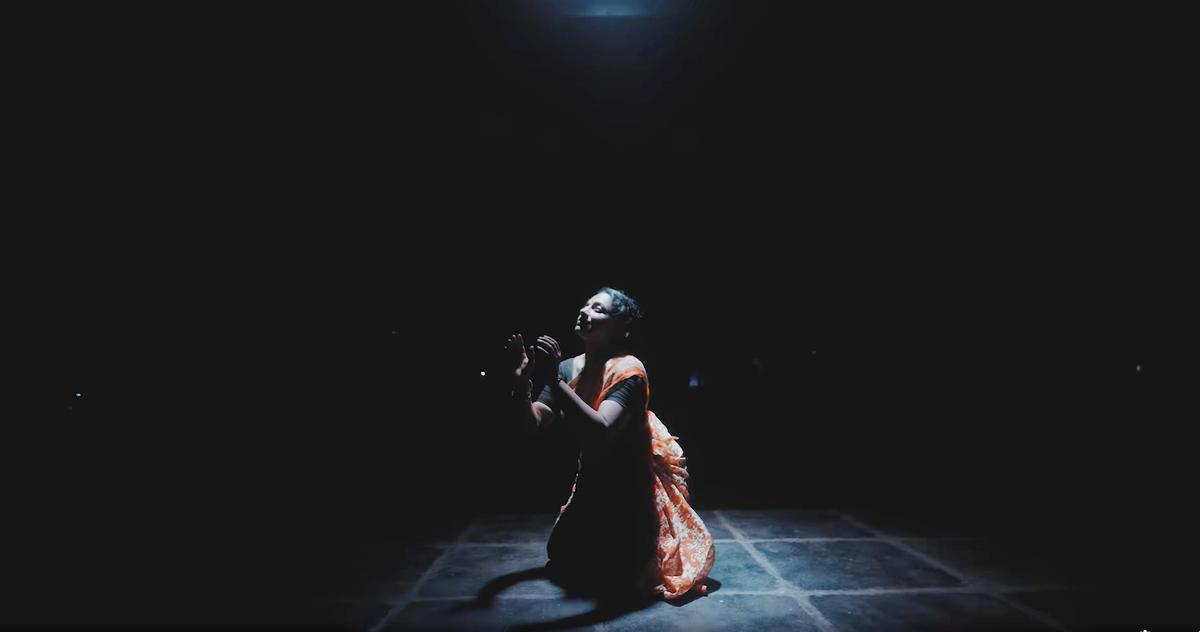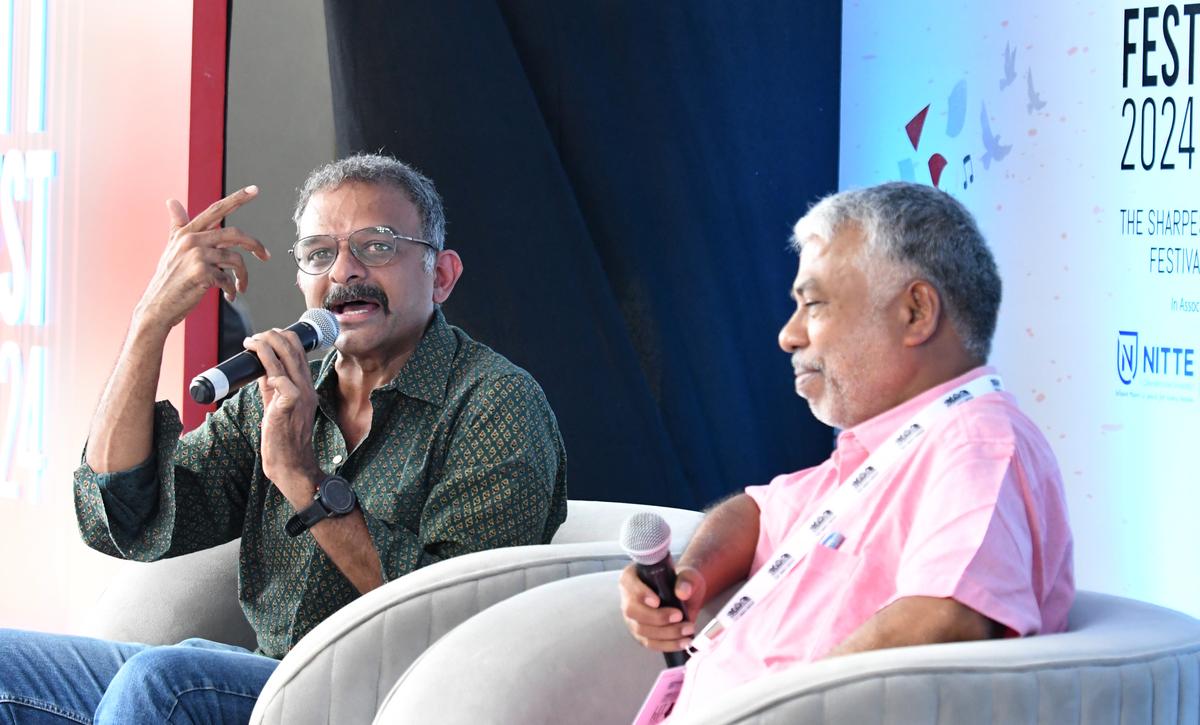[ad_1]
The classical art forms of India are being reinterpreted by many practitioners who are pushing the boundaries by coming up with creative productions that focus on modern India and social issues.
The latest effort to give the classical arts a new relevance is a nearly 10-minute video on ‘Kaigal’, author-poet Perumal Murugan’s hard-hitting poem on manual scavenging that has been composed and sung by Carnatic vocalist TM Krishna.
When Koodiayattam artiste and choreographer Kapila Venu first heard ‘Kaigal’ (hands), she was mesmerised by the powerful lyrics, which had been composed and sung by Krishna. A fan of the vocalist, she happened to listen to his album of renditions of Murugan’s poetry. The fact that he was singing about the evils of manual scavenging moved her. “The lyrics, the music, and the imagery it evoked were unforgettable,” says Kapila.
Author-poet Murugan’s raw lines speak about manual scavenging and the indignities heaped on people forced to work as scavengers on account of their being born into a particular community.
Kapila had presumed that the practice had died out in the country over the years. “Even then, I was disturbed by the fact that the less privileged people were supposed to clean someone else’s toilets. So, when I heard the song, I kept listening to it on loop.”
Kapil asked Krishna if she could work on the song; both he and Murugan had no objections to her visualising the lines. A few days later, she sent the song to Naveed Mulki, a filmmaker friend of hers. “It touched him as well, and he too wanted to work with the song,” says Kapila.
Naveed and Kapila were aware that they had to approach it with great sensitivity and caution. Naveed recounts both reading up on the practice and how communities engaged in scavenging were stigmatised on account of their work. They realised that dry toilets still existed in places in India, and even in places where the practice had been stopped many years ago, “The community found it difficult to escape the stigma. They found it difficult to get other opportunities,” adds Kapila.
Naveed, who had filmed Kapila’s ‘Mahishasuramardini’, had enjoyed the experience of working with her. “I felt we had common inspirations,” he says.
He points out how one feels numb by scenes of day-to-day suffering and the tendency is to block it from the mind or turn our heads away. He decided to approach the project with respect and care.
After doing their research, they decided to film Kapila performing to the lines of ‘Kaigal’. Shot in Irinjalakuda about three months ago, the nearly 10-minute film shows the artiste at her expressive best as she visualises Murugan’s lines.

Kapila in a still from ‘Kaigal’.
| Photo Credit:
Special arrangement
In a statement released with the short, Naveed says: “The poetry of Perumal Murugan and its haunting rendition by TM Krishna offered us another doorway to enter the dire world of the manual scavenger… It led to conversations, to better understanding their world view, to acknowledging the depths and scale of this social condition. And our starting point was to respond in our own expressions. In movement and frame. This is one voice, in an echo of voices, to try and shed light on the need to bring back the anchor of dignity, a wholeness of life that every human being must have the fundamental right to possess.”
A pair of slender, work-worn hands wearing bangles, running her fingers in the sand, and holding a broom and a wicker basket, capture the indignity of the work of manual scavengers. In the background, Krishna sings: ‘Should foul excrement be picked up by hands?’ In the claustrophobic space signifying a dry toilet, Kapila visualises the torment of a manual scavenger who uses her hands — hands that are meant to plough, cook, hug and pray — to clean others’ toilets.
Kapila and Naveed located a small space to capture the space of a dry toilet where the workers are expected to work. “We shot with the spontaneous emotions that emanated and went with the flow. Then Naveed edited it, and we showed it to Krishna and Perumal Murugan,” explains Kapila.
They were aware that since it is a sensitive issue, it could go wrong if it was not done well. They debated if they were even qualified to talk about it. “Coming from a very privileged background, we did not want to see it as a kind of [cultural] appropriation. Still, we felt we need to talk about it,” says Naveed.

TM Krishna (left) and Perumal Murugan.
| Photo Credit:
JOTHI RAMALINGAM B
Krishna and Perumal Murugan greenlighted the project and told them that they liked it.
Perumual Murugal liked how the poetry had been visualised and the kind of response it created in them. Kapila also had a long conversation with Krishna. “I wanted to make sure that we were not doing anything that was politically wrong. He told me that when he was singing the song, people had all kinds of opinions about it,” says Kapila.
When she wondered whether a song on such a serious issue should be made so sonorously, Krishna told her, “It is also important that people notice the beauty and the discomfort of the theme juxtaposed together. It would make people notice it and think about it.”
It also cleared her doubts about the film, as “it is a beautiful film, technically well-made and framed beautifully.” She understood that the short was a person’s filmmaking style and not deliberately done to romanticise the theme in any way.
Kapila and Naveed worked on polishing it and then loaded it on his channel and on their Instagram accounts as well.
“We talked a lot about whether it would be right or wrong to work on such a project. But we decided that it is important that we talk about it. What is important is the position we choose to talk from. We have tried to be positive and are open to all kinds of criticism,” elaborates Kapila.
The immersive experience of the short is enhanced by the performance in the shadows. Shot in a tiny space and on the stage where Kapila practices, the video, Naveed says, juxtaposes two spaces to act as a metaphor for the two stages of life – when one is still exploring and the other at a stage when one is experienced and stronger, when one is truly free.
“From a spotlight in the darkness, the camera moves to embrace infinite darkness. It is a visual language that complements the lyrics,” explains Naveed.
The film is dedicated to Kapila’s friend, the late Bhakti Nefertti who had chastised her when Kapila had complained about a dirty public toilet at a bus station. “She scolded me and told me that if it is not clean, we must clean it ourselves. What makes one assume that a less privileged person was always obliged to keep our toilets clean for us!”
[ad_2]
Source link





